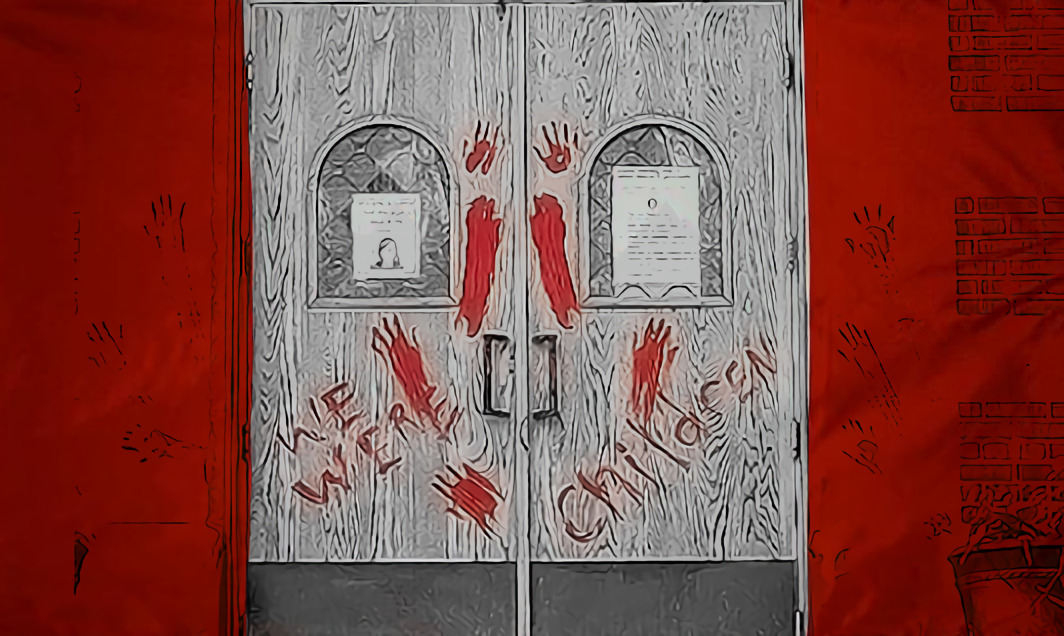In the wake of the discovery of 215 unmarked graves at the former Kamloops residential school in British Columbia, a further 751 unmarked graves have been discovered on the grounds of the former Marieval Indian Residential School in Saskatchewan. With the grounds of well over 100 schools (and possibly many more) still left to search, it is highly likely that more will be uncovered in the coming months and years. These grisly discoveries are bringing home the brutal reality of the genocide of Indigenous people. As a result, we are witnessing a broad debate and a significant change in views on Canada’s colonial past and present.
The hashtags #CancelCanadaDay and #NoPrideinGenocide have trended on social media. Statues of some of the architects of the residential school system and symbols of British imperialism have been toppled in Toronto and defaced in Victoria and Edmonton; a Catholic cathedral in Saskatoon was covered in paint, and multiple churches have burned to the ground in British Columbia.
As Canada Day on 1 July approached, a debate erupted over whether the national holiday should be celebrated at all, with several municipalities across the country cancelling their planned festivities.
A sea change
The newfound anger has revealed a sea change in attitudes towards Indigenous struggle. Two significant polls have been conducted in relation to Indigenous issues this month, one by the Innovative Research Group and the other by Abacus Data.
Polls generally provide a snapshot of the mood in society at any given time, and can produce contradictory results. However, these recent polls on Indigenous issues and the residential schools do in fact reveal that a massive shift in class consciousness is taking place across the country, driven by Indigenous struggle.
According to an Innovative Research poll, “Canadians have never been more aware of Indigenous issues. The number who have read, seen, or heard something lately about Canada’s Indigenous peoples is now at 75%. In 4 out of the 5 times we tracked in the past, that number was 42 or 43%. Back in 2007, it was at 52%.”
The report continues:
“There is no question this increased awareness is due to the Kamloops discovery. Three quarters (77%) of Canadians are at least somewhat familiar with the discovery of the bodies. This is very unusual for an Indigenous news event. In 2019, just 48% were at least somewhat familiar of the report from the National Inquiry into Missing and Murdered Indigenous Women and Girls. In 2015, just 41% were at least somewhat familiar with the Truth and Reconciliation Commission.”
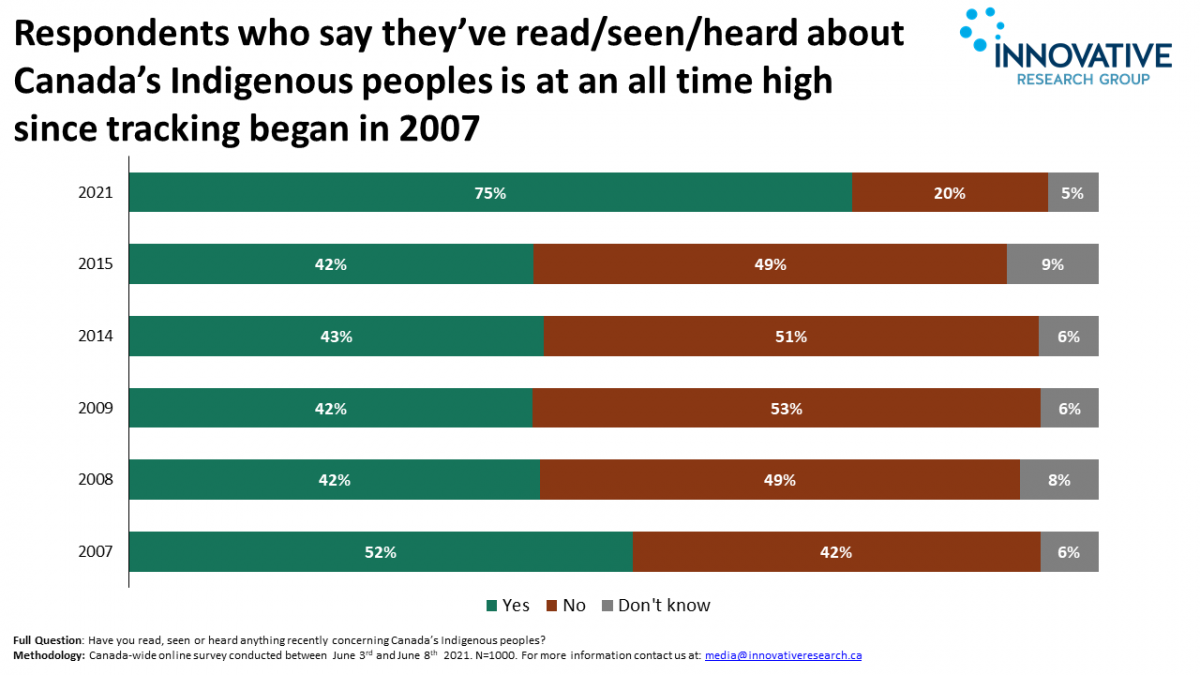
Greg Lyle, the president of Innovative Research Group explained the following:
“Something important is happening on Indigenous issues... I started tracking attitudes on Indigenous issues in the early 90s. I have never seen Canadians this engaged…. Perhaps more importantly, we have seen core attitudes changing… This time looks different.”
Also significantly, 81 percent are angry when thinking about the treatment of Indigenous peoples in residential schools (54 percent are “very angry” with 27 percent “somewhat angry”).
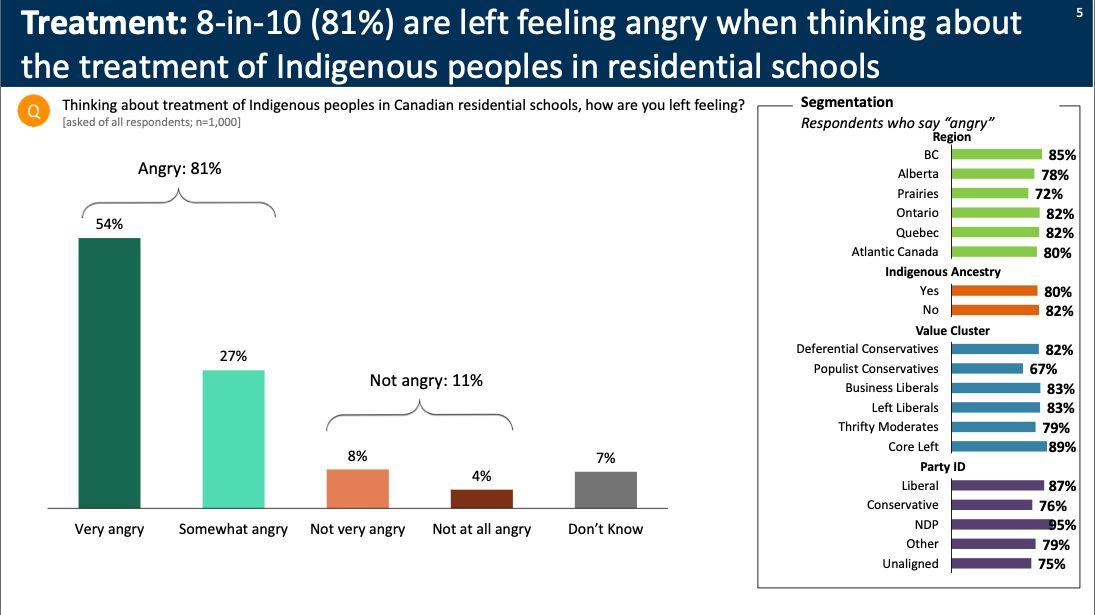
A poll conducted by Abacus also highlighted similar trends. Perhaps most significantly, it found that 58 percent agreed that the residential school system was a policy of genocide (25 percent “strongly agree” and 33 percent agree). This rises to 60 percent among immigrants, and 69 percent among young people. The results for youth are significant and not accidental.
Quantity into quality
The Indigenous struggle, like any other social struggle, has its ebbs and flows, but why is the Indigenous struggle having such an impact on social consciousness now?
The first and most obvious reason is the discovery of the unmarked graves itself. The brutality of the residential school system and the genocide of Indigenous peoples has become undeniable. This is changing the way people understand Canada’s history, and this change in understanding is driving shifts in social consciousness.
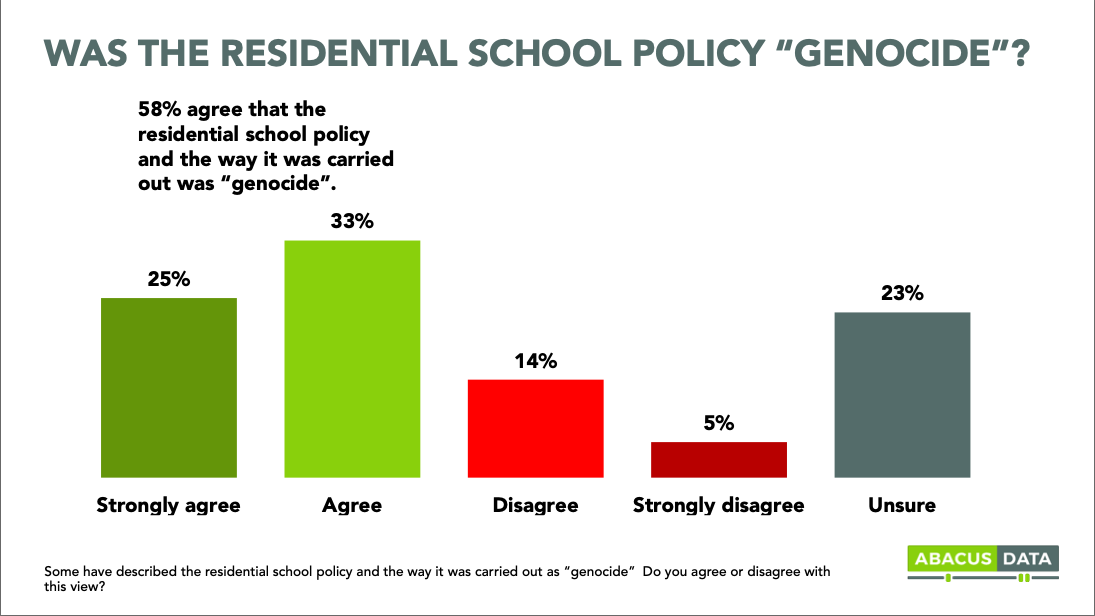
But another reason is the dialectical transformation of quantity into quality. The Indigenous struggle against colonization and oppression can be traced back centuries. In more recent times, it has been a prominent feature of the class struggle in Canada. From the Oka Crisis (Kanesatake Resistance) in 1990, we see an almost uninterrupted eruption of struggles: in Ipperwash (1995), Ts'peten/Gustafsen Lake (1995), Esgenoôpetitj/Burnt Church (1999), and the struggles of the Haudenosaunee around Kanonhstaton in Ontario (2006-2008).
Even more recently, we have seen the struggles in Baffinland, the launching of Idle No More, the renewed struggle of the Haudenosaunee with the 1492 Land Back Lane movement, the Mi’kmaq and the question of fishing rights, and the struggle of Wet’suwet’en. In the midst of these struggles came the Truth and Reconciliation Commission, and the National Inquiry into Missing and Murdered Indigenous Women and Girls. The constant eruption of intense episodes of Indigenous struggle is forcing people to assess and reassess the situation. The quantity of struggles eventually leads to a qualitative change in social consciousness.
Social being determines social consciousness
We cannot forget the socioeconomic context in which these struggles are taking place. Capitalist society is in a deep crisis around the globe. The pandemic triggered and deepened an economic crisis that was on the verge of erupting in any case, exposing the rottenness of capitalist society for all to see.
The propagandists of capitalism like to proclaim that “we are all in this together”. But everybody knows this is a lie. The working class and the poor have suffered the brunt of the pandemic in every sense. Most of the infections and deaths have affected the working class, especially the front-line, essential workers.
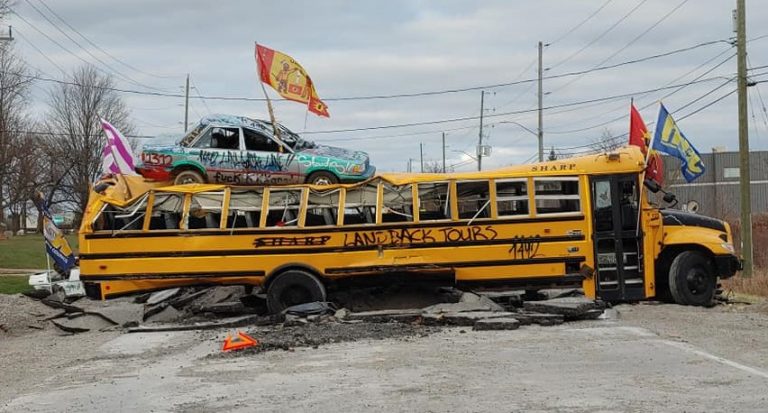 A blockade at 1492 Landback Lane / Image: Fightback, Facebook
A blockade at 1492 Landback Lane / Image: Fightback, Facebook
These essential workers were declared heroes at the start of the pandemic, and some even received a small bump in pay for a time. Now the hero pay has been taken away, and essential workers are facing a crisis of cuts and lockouts. Meanwhile, the rich have gotten richer, the billionaires are amassing and hoarding wealth, while the big banks have doubled their profits.
Since the struggle of the Wet'suwet'en against the Coastal GasLink pipeline first erupted several years ago, the Indigenous struggle has been at the forefront of the class struggle in Canada. These struggles have been inherently anti-capitalist, with Indigenous people fighting against private corporations encroaching on their land and denying their fundamental rights.
Solidarity with Indigenous peoples and awareness of the brutality of colonization and genocide has grown with each new stage in these struggles, as the broader working class becomes increasingly aware that they and Indigenous people are battling the same capitalist class..
The right wing to the rescue
Various right-wing commentators and politicians have clumsily waded into these debates. Since the discovery of the mass of unmarked graves in Kamloops, and especially since the calls for the cancellation of Canada Day, the National Post and Sun Media, in particular, have published multiple articles in defence of Canadian history; of historical figures such as John A. Macdonald [Canada’s first Prime Minister who introduced the residential school system]; and of the genocidal policies of colonization.
The right wing engages in historical revisionism. Many of these articles barely acknowledge the discovery of the unmarked graves on the grounds of former residential schools. The actual history of colonization and genocide is ignored. If they do mention it, it is glossed over before the author begins to extol the virtues of Canada’s history.
It’s the same for the long list of other injustices and crimes committed by the ruling class in Canada’s history, which we have discussed in previous articles.
An article in the Toronto Sun fits this mold perfectly. The author starts by saying “Cancel Canada Day celebrations? Not a chance! Some indigenous voices and minority communities have lately objected to Canada Day celebrations, based on some tragic recent events. Even some bleeding heart liberals have joined the bandwagon of condemning Canada as a political entity.”
The discovery of the unmarked graves in Kamloops and the residential school system are simply “some tragic events”. While the deaths of the children at the schools eventually get a throwaway mention, the author follows it up by saying, “It’s true that marginalized communities have suffered greatly in the past. But there is a readiness now to address the crimes of a bygone era. The majority of Canadians acknowledge these wrongs and wish to rectify them.” Some people suffered, but that’s all in the past! Nothing to see here, move along.
The author continues: “As far as defining ideals, Canada is definitely number one. Canada is a great country that stands up for humanitarian values. Our ideals of a pluralistic society based on humane principles are crystal clear. Moreover, our Charter of Rights and Freedoms makes no distinction between the diverse communities of Canadians.”
This is followed up later with the statement that “It isn’t just Canada’s laws and policies, but the very fabric of Canadian society that exudes humanitarian principles of tolerance and civility.”
This is astounding stuff. What about the Indian Act [a federal law that governs First Nations, their bands, and the First Nations reserve system]? That act makes a clear distinction between communities in Canada, and it would be hard to argue that it “exudes humanitarian principles of tolerance and civility”. There have in fact been a number of articles in the capitalist media arguing that Canada is not a racist country. None of them mention the Indian Act, whose existence demonstrates that racism is embedded in the foundations of the nation. Never mind that racism and hate crimes are on the rise.
Jason Kenney hits the mark (for all the wrong reasons)
Just a few days after the discovery of the graves in Kamloops went public, Jason Kenney [Premier of the province of Alberta and leader of the provincial United Conservative Party] launched an attack on “cancel culture”, in defence of John A. Macdonald and Canada’s history in general. Kenney takes a slightly different approach to his peers, in that he acknowledges plenty of the injustices and crimes of Canada’s history, but nevertheless concludes:
“I think Canada is worth celebrating. I think Canada is a great historical achievement… It is an imperfect country but it is still a great country, just as John Macdonald was an imperfect man, but was still a great leader. If we want to get into cancelling every figure in our history who took positions on issues at the time that we now judge harshly, and rightly, in historical retrospect, then I think almost the entire founding leadership of our country gets cancelled.”
Was John A. Macdonald great? We’ve already discussed this in previous articles, but if being great includes the oppression of Quebec, and the residential school system, then John A. Macdonald must be really great. Does this greatness also include the treatment of Chinese immigrant workers constructing his grand legacy, the Canadian Pacific Railway, where, let’s not forget, one Chinese worker died for every mile of track laid?
Further along, Kenney says: “If the new standard is to cancel any figure in our history associated with what we now rightly regard as historical injustices, then essentially that is the vast majority of our history.”
The right wing is trying to center the debate on “cancelling” history. Kenney says we cannot cancel our history, we must learn from it. This is utterly dishonest. It’s not about cancelling history at all. For the right wing, arguments about cancel culture are used as a shield to protect against any criticism of Canada’s history.
Kenney is right about one thing though: injustices and crimes were carried out for “the vast majority of our history”. He even provides us with numerous examples, such as Wilfrid Laurier [Prime Minister of Canada from 1896 - 1911 who implemented numerous racist policies] and his anti-immigrant policies, in the form of the Chinese head tax and the “continuous journey” policy. This is the same Laurier who signed an order in council intended to keep out Black Americans escaping segregation in the south in 1911.
Kenney also informs us of William Lyon Mackenzie King’s [Prime Minister of Canada from 1935 - 1948] “none is too many” policy that made it impossible for Jewish people fleeing Nazi Germany from coming to Canada as refugees. Kenney also mentions Trudeau Sr. [Pierre Trudeau, father of current Prime Minister Justin Trudeau, who was in power from 1968 - 1979 and from 1980 - 1984], who, among other things, such as the White Paper, brought in martial law in Quebec and suspended civil liberties across the country, which led to the arbitrary arrest and detention of thousands of people who had nothing to do with the FLQ crisis.
One at a time, Mr. Kenney! There are so many “black marks” and crimes in Canada’s history that they couldn’t all possibly be dealt with at once. The focus is largely on John A. Macdonald right now because of the role he played in the founding of the country, the oppression of Indigenous people, and the residential school system. But all these other figures, such as Laurier and Mackenzie King, will get what they deserve soon enough.
Erin O’Toole misses the mark
Erin O’Toole [leader of the federal Conservative Party] found the news about the unmarked grave in Kamloops “very troubling” and “dreadful”, but he is “concerned that injustices in our past, or in our present, are too often seized upon by a small group of activist voices who use it to attack the very idea of Canada itself.” He seems to have stopped trying to claim that the residential schools “were designed to provide education.”
According to O’Toole, the uncovering of and focus on the crimes of Canada’s past, the calls for the removal of statues and names from institutions, the calls to cancel Canada Day, all of these things could only come from a small minority of “activists” who want to “tear Canada down”. This is another tactic of the right wing.
But some of the recent poll results already discussed above would say otherwise. In addition, the Abacus poll revealed the following: “On the heels of the removal of the Egerton Ryerson statue in Toronto and discussions around changing the name of the university named in his honour, appetite is high among Canadians for symbolic measures to erase relics of Canada’s racist past and honour those who were adversely affected by them. Fifty-eight percent of Canadians want to see buildings and institutions named after the architects of the residential school system renamed. Sixty-five percent of Canadians would be in support of a national statutory holiday honoring the survivors and victims of the residential school system.”
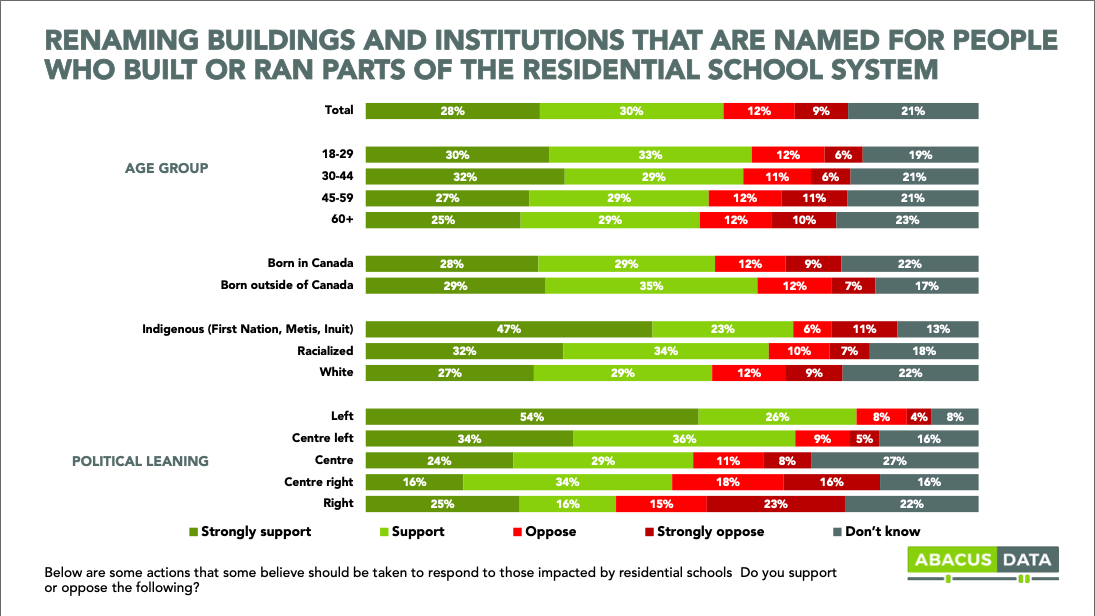
According to the Conservatives, it was only a “mob” of “Marxist vandals” and “criminals”, who toppled the Ryerson statue against the will of the majority. But again, this narrative doesn’t fit the facts. While it may have been a minority of protestors who toppled the statue, it would seem that they were, in a direct and radical manner, expressing the will of the majority.
As the scale of the atrocities committed against Indigenous peoples is increasingly revealed, more and more statues will be removed and more names will be changed, as they should be. The right wing will froth at the mouth, and continue to argue that removing names and statues is “cancelling” or “erasing” history.
Erasing history?
The right wing argues that removing statues of the monsters of Canada’s history and changing the names of streets and institutions is “erasing” history. This is nonsense. People want statues removed and names changed precisely because they know their history. Removing statues and names is more about understanding and acknowledging actual history, not the historical myths peddled by the ruling class and the right wing.
Statues and names of institutions are not so much about history, but about the history we are celebrating and venerating. Once people begin to learn actual history, it makes sense that they would begin to wonder why Canadian society would be venerating monsters who implemented racist policies and genocide.
Furthermore, history is not only preserved in statues. History is taught in schools, displayed in museums, explained in books, and preserved in countless other ways. But what about the education system?
Some of the most interesting results from the Abacus poll were in relation to education. 62 percent of respondents said students didn’t learn enough about residential schools in their province. 70 percent said that schools tend to play down or understate what happened at residential schools. Three percent said that when they learned about residential schools it was framed “very positively”, seven percent said it was framed “more positively than negatively” and 41 percent said they didn’t learn about it at all!
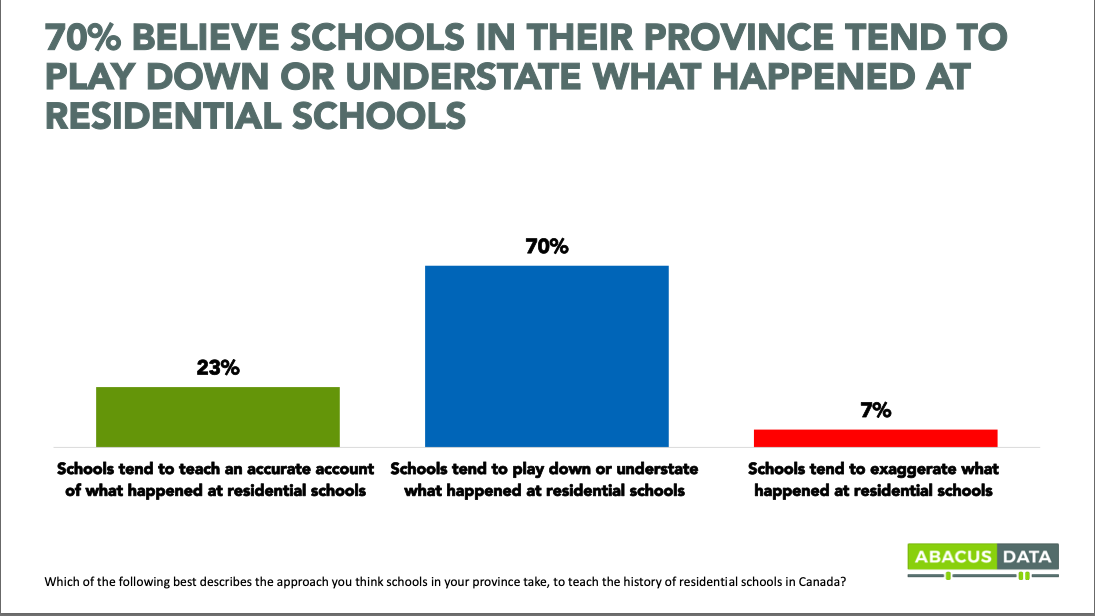
Kenney, for example, argues that we need to keep these statues in order to preserve history, but then presides over a curriculum that removes educational components about residential schools because it is “too sad”. Chris Champion, one of the Alberta government’s advisors on the curriculum, has previously said that including Indigenous perspectives in school lessons is a “fad”. Now he’s arguing that the 215 graves discovered in Kamloops is not evidence of genocide. Talk about erasing history!
The fact is that the right wing wants to preserve a sanitized and mythologized version of Canada’s history that erases the brutal history of colonization and the continued genocide of Indigenous peoples. One that ignores or prettifies the injustices and crimes committed in the name of capitalism.
The right wing doesn’t want people to learn the actual facts of history, which brings people to conclusions that the right wing cannot accept. Rather than a few black marks, people are concluding that Canada’s history is permeated with rot, that the founding of the country and its current history are in fact based on these rotten foundations. People are beginning to conclude that something must be done about this—not just words, or symbolic gestures, but real action. An historical reckoning is at hand.
The morality of the ruling class determines its view of Canada’s history. According to the right wing, the domination of the ruling class itself justifies Canada’s history, including its crimes and injustices. These were in fact necessary for the capitalist class to achieve its rule. That’s why the right wing has to defend these monsters. For the ruling class, its power and rule, its prosperity and position on world markets, more than justify the colonization of the country, the subjugation of Indigenous peoples, and the oppression of Quebec.
The working class and youth, in the context of the shocks to consciousness received with the general crisis of capitalism, the prominence of Indigenous struggle, and the discovery of the graves, are coming to opposite conclusions. They are increasingly breaking radically with the past, and with the history of Canadian capitalism, replete with oppression and exploitation. This leads them to break radically with Canada’s capitalist present and future. For workers and youth, they are rising against this domination of the ruling class and starting the fight for a new future.
How to really cancel Canada Day
The polls discussed above show that a majority are angry about the residential schools and want to see something done about the continued oppression of Indigenous peoples.
Another recent poll showed, however, that despite these sentiments in support of Indigenous struggle among the majority of people, only a small minority actually want to see Canada Day cancelled. When asked “Do you feel with all the questions about Canada and its historical record, it would be best to cancel Canada Day this year?”, the poll shows only 14 percent in favour.
The results could have been different had the poll been conducted after the discovery of the 751 graves in Saskatchewan. Furthermore, some people may want to celebrate Canada Day out of a desire for unity or “reconciliation”. This is another line being pushed by the capitalist media. Others may want to preserve the statutory holiday and worry they may lose a day off work, and still others may be looking forward to festivities after long lockdowns and a draining pandemic. And yes, some will want to celebrate out of a sense of patriotism and nationalism. If we continue to argue for solidarity and unity with Indigenous people, and continue to expose the crimes of Canadian capitalism, it is entirely possible that more and more people will become determined not to celebrate Canada Day.
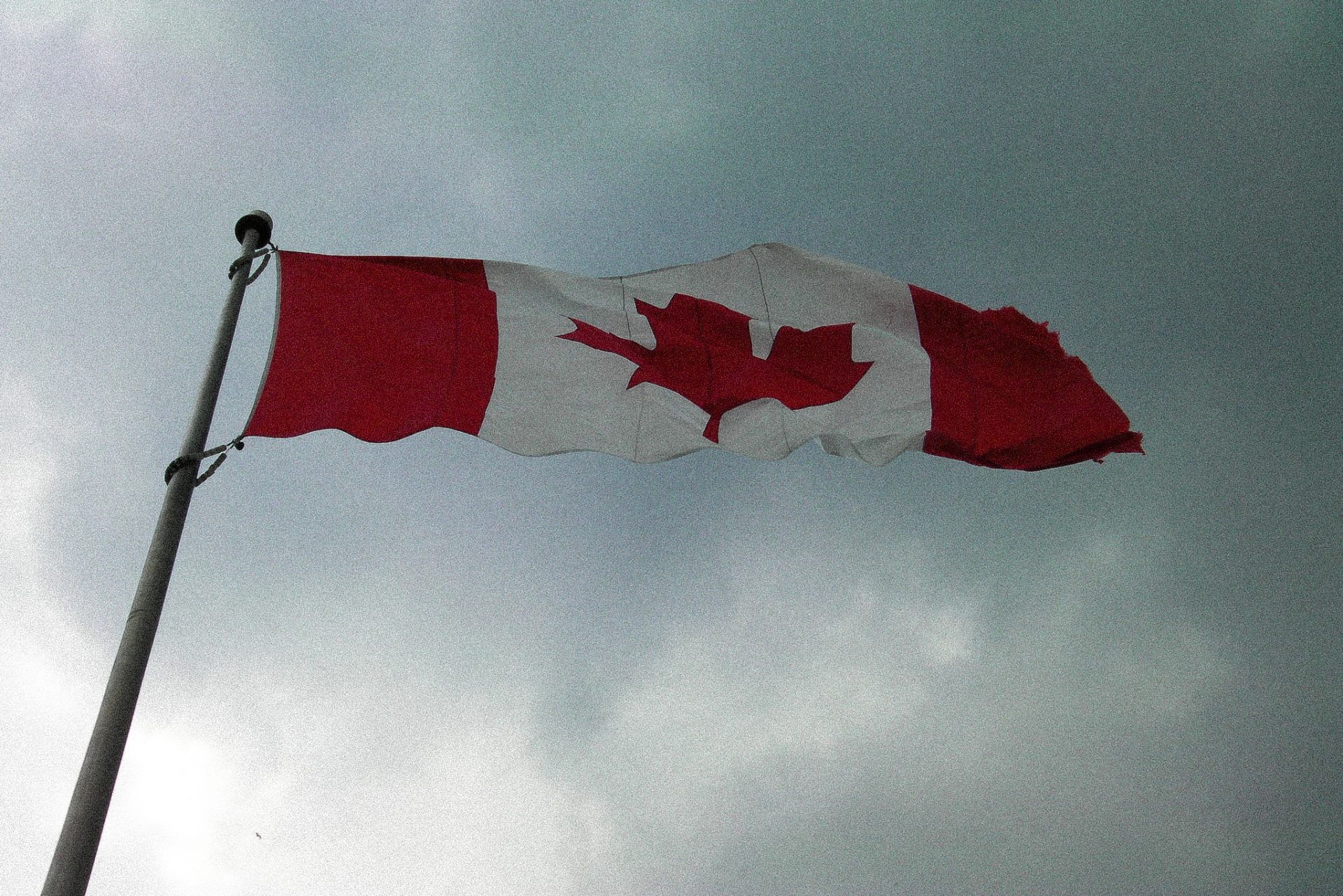 Canada Day will always be a celebration of capitalist Canada, including all its historic crimes and present injustices / Image: 1websurfer, Flickr
Canada Day will always be a celebration of capitalist Canada, including all its historic crimes and present injustices / Image: 1websurfer, Flickr
While agitating for the cancellation of Canada Day is a worthwhile pursuit and a powerful propaganda tool, it also shouldn’t necessarily be our primary goal. Changing street names, removing statues, and even cancelling Canada Day are largely symbolic victories. Where street names have been changed, statues removed and Canada Day events cancelled, these are sacrifices the ruling class and political establishment are prepared to make in order to appease the mood of anger coursing through society.
Even if Canada Day is cancelled in a number of places this year, it is unlikely to be cancelled forever. Canada Day will always be a celebration of capitalist Canada, including all its historic crimes and present injustices. It will always be a celebration of the ruling class’ version of history and its vision for the future. They won’t allow the celebration of their self-perceived greatness to be abolished forever.
We must fight these ideological battles and expose the crimes of the ruling class and capitalism in general. Canada is founded on the oppression of Indigenous peoples and Quebec, on the brutal exploitation of the working class and immigrants. These things continue to this very day. The crimes of Canada’s past are reflected in its present crimes, which can be summed up as the needs of profit over the needs of people. In order to radically break with Canada’s past, we must also radically break with Canada’s present.
The fight against Canada Day is the fight against the ruling class. The fight against the ruling class is the fight against capitalism. This is a fight against pandemic profiteering, against austerity, low wages, and unaffordable housing. It’s the fight against racism and the continuation of the residential school policies in the form of foster care. It’s the fight for an immediate solution to all drinking water advisories and an end to poverty in First Nations communities. It’s the fight for Indigenous land and resource rights and against the continued corporate and government encroachment of Indigenous lands.
Only through militant class struggle, through determined class unity between the workers and all oppressed peoples, only by overthrowing capitalism and establishing a socialist society of genuine equality, can we end the misery of capitalism and put an end to the ruling class’s Canada Day once and for all.

